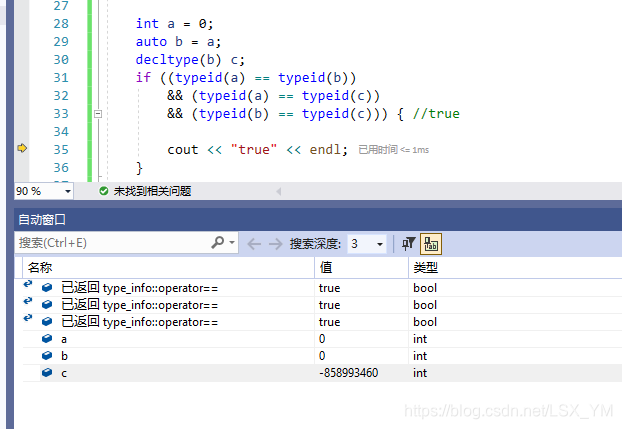简明描述三者概念
auto:自动类型推导,声明变量时必须赋初值。类型由右值的决定
decltype :声明表达式类型,声明变量时时不必赋初值。类型由编译器根据表达式自动推导
typeid:运行时类型信息(RTTi),不能用来声明变量
auto 和 decltype都是编译时就确定的类型,typeid更像是一个返回类型信息的函数。因不是实际类型,故不能用来声明变量。使用时需包含头文件。
先上代码:
int a = 0;
auto b = a;
decltype(b) c;
if ((typeid(a) == typeid(b))
&& (typeid(a) == typeid(c))
&& (typeid(b) == typeid(c))) { //true
cout << "true" << endl;
}
可以看到a、b、c的类型完全相同,都是int类型

补充两条
int fun() {
cout << "fun is run" << endl;
return 0;
}
int c;
decltype(( b )) d = c;//( b )表示b的引用,故c的类型为int &
decltype(fun) *f = fun; //操作数为函数时,decltype(fun)为函数类型,多用来定义函数指针
f(); //"fun is run"
在发生继承时的使用
定义两个类Base、Derive,使Derive继承Base。
class Base {
public:
int fun() {
return 0;
}
virtual int vir_fun1() {
return 0;
}
};
class Derive : public Base {
public:
int fun() {
return 0;
}
virtual int vir_fun1() override /* override: 表示该函数必须重写基类函数*/ {
return 0;
}
};
定义如下变量
Base Ba;
Derive Da;
Base* pBa = &Da;
Base& Bb = Da;
typeid的效果
if (typeid(pBa) == typeid(Derive*)) { //false
cout << "type of pBa is Derive*" << endl;
}
else if (typeid(pBa) == typeid(Base*)) {//true
cout << "type of pBa is Base*" << endl;
}
if (typeid(*pBa) == typeid(Derive)) { //true 基类指针转化为子类
cout << "type of *pBa is Derive" << endl;
}
if (typeid(Bb) == typeid(Derive)) { //true 基类引用转化为子类
cout << "type of Bb is Derive" << endl;
}
注意,这种动态类型转化只有当父类中存在虚函数时才能成功。若父类中不存在虚函数是不会发生的
class Base {
public:
int fun() {
return 0;
}
// virtual int vir_fun1() {
// return 0;
// }
};
class Derive : public Base {
public:
int fun() {
return 0;
}
// virtual int vir_fun1() override /* override: 表示该函数必须重写基类函数*/ {
// return 0;
// }
};
再看效果
Base Ba;
Derive Da;
Base* pBa = &Da;
Base& Bb = Da;
if (typeid(pBa) == typeid(Derive*)) { //false
cout << "type of pBa is Derive*" << endl;
}
else if (typeid(pBa) == typeid(Base*)) {//true
cout << "type of pBa is Base*" << endl;
}
if (typeid(*pBa) == typeid(Derive)) { //false
cout << "type of *pBa is Derive" << endl;
}
if (typeid(Bb) == typeid(Derive)) { //false
cout << "type of Bb is Derive" << endl;
}
auto 及 decltype 在发生继承时的效果
auto autoBc = Bb; //Base 会把引用类型转化为实际类型
auto autoBd = pBa; //Base*
decltype(Bb) Bd = Bb;//Base & 不会把引用类型转化为实际类型
decltype(autoBc) Be = autoBc;//Base
if (typeid(autoBc) == typeid(Base)) { //true
cout << "type of autoBc is Base" << endl;
}
if (typeid(autoBd) == typeid(Base *)) { //true
cout << "type of autoBd is Base*" << endl;
}
if (typeid(Bd) == typeid(Base &)) { //true
cout << "type of Bd is Base &" << endl;
}
if (typeid(Be) == typeid(Base)) { //true
cout << "type of Be is Base" << endl;
}
不得不提的dynamic_cast
跟RTTi相关的不仅有typeid,还有一个类型转换关键字dynamic_cast,还是代码描述
Base* pBb = &Ba;
if(dynamic_cast<Derive *>(pBa) != nullptr) { //true
cout << "pBa dynamic_cast to DerivePtr success" << endl;
}
if (dynamic_cast<Derive*>(pBb) == nullptr) { //true
cout << "pBa dynamic_cast to DerivePtr fault" << endl;
}
可见当父类指针指向子类对象时,父类指针才能成功动态转化为子类指针,否则转换失败,结果为nullptr,同样,当父类中不存在虚函数时会导致编译失败。
此文仅为本人学习c++过程中的笔记,分享出来供大家探讨,不应作为技术参考。如发现不对的地方还望不吝赐教。
谢过




















 164
164











 被折叠的 条评论
为什么被折叠?
被折叠的 条评论
为什么被折叠?








